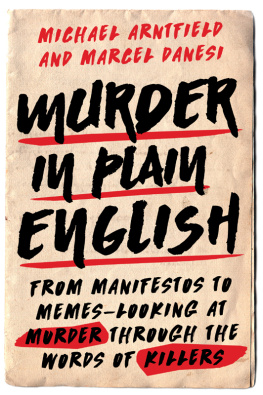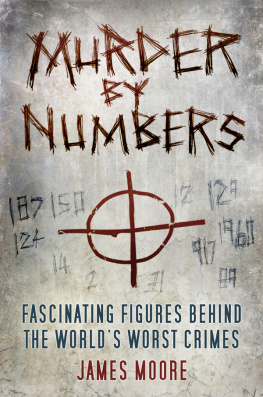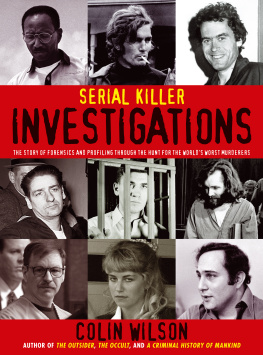LISA DOWNING is professor of French discourses of sexuality at the University of Birmingham, UK. She is the author of Desiring the Dead: Necrophilia and Nineteenth-Century French Literature, The Cambridge Introduction to Michel Foucault, and (with Libby Saxton) Film and Ethics: Foreclosed Encounters.
The University of Chicago Press, Chicago 60637
The University of Chicago Press, Ltd., London
2013 by The University of Chicago
All rights reserved. Published 2013.
Printed in the United States of America
22 21 20 19 18 17 16 15 14 13 1 2 3 4 5
ISBN-13: 978-0-226-00340-5 (cloth)
ISBN-13: 978-0-226-00354-2 (paper)
ISBN-13: 978-0-226-00368-9 (e-book)
Library of Congress Cataloging-in-Publication Data
Downing, Lisa.
The subject of murder : gender, exceptionality, and the modern killer / Lisa Downing.
pages. cm
Includes bibliographical references and index.
ISBN 978-0-226-00340-5 (hardcover : alkaline paper) ISBN 978-0-226-00354-2 (pbk. : alkaline paper) ISBN 978-0-226-00368-9 (e-book) 1. MurderersPress coverage. 2. Women murderersPress coverage. 3. Murder in literature. 4. Wuornos, Aileen. 5. Lacenaire, Pierre Franois, 18001836. 6. Hindley, Myra. 7. Lafarge, Marie, 18161852. 8. Nilsen, Dennis Andrew, 1945. 9. Jack, the Ripper. I. Title.
HV6513.d685 2013
364.152 3dc23
2012024191

This paper meets the requirements of ANSI/NISO Z39.48-1992 (Permanence of Paper).
The Subject of Murder
Gender, Exceptionality, and the Modern Killer
LISA DOWNING
THE UNIVERSITY OF CHICAGO PRESS
CHICAGO AND LONDON
Contents
Acknowledgments
For a number of reasons, some having to do with the subject matter and others with circumstance, this has been an especially challenging and difficult book to write. It has been reconceptualized numerous times, and several drafts have been produced and discarded along the way. The current version, however modest, is the most compelling narrative I can tell about the ways in which modern Western society, with its norms, iniquities, and structural neuroses, dreams the figure of the murderer as an exceptional outsider, rather than as a product of our own making.
Several organizations and individuals are owed thanks for the advice, help, and support they have provided over the six years in which this process has unfolded.
Firstly, the Arts and Humanities Research Council (AHRC) awarded me a Research Leave Scheme grant in 2006, which enabled me to draft several chapters of the book (in the form in which I originally imagined it: a study of the figure of the murderer in nineteenth-century France). Secondly, the award of a Philip Leverhulme Prize in 2009 enabled me to extend my institutional research leave from the University of Exeter in order to reformulate the book project as a more ambitious and historically wide-ranging study of the modern murdering subject. I am grateful to both of these funding bodies for the valuable research time they enabled, and to Queen Mary, University of London and the University of Exeter for granting periods of institutionally funded leave in, respectively, 2005 and 2009.
The following individuals providedvariouslyideas, references, source materials, discussion, opportunities to present work, and/or feedback on various aspects of the project and chapter drafts: Heike Bauer, Chiara Beccalossi, Lara Cox, Peter Cryle, Richard Dyer, Alex Dymock, Michael Finn, Miranda Gill, Robert Gillett, Louise Hardwick, Peter Hegarty, Marian Hobson, Michael G. Kelly, Katherine Lunn-Rockliffe, Francesco Manzini, Rachel Mesch, Lorna Milne, Alison Moore, Douglas Morrey, Dany Nobus, Kyra Pearson, Dieter Rossi, Elizabeth Stephens, Ricarda Vidal, Caroline Warman, and Valerie Worth. I am indebted to them all for their kindness and valuable input.
An earlier version of part of first appeared as part of The Birth of the Beast: Death-Driven Masculinity in Monneret, Zola, Freud, by Lisa Downing, in Dix-Neuf, the online journal of the Society of Dix-Neuvimistes, no. 5 (September 2005). I am grateful for the permissions received to reproduce this material.
Finally, I would like to thank Doug Mitchell, Tim McGovern, and the team at the University of Chicago Press for their kindness and efficiency, and the three expert readers, Keith Reader, Calvin Thomas, and David Schmid, for their invaluable feedback and advice on the manuscript.
Introduction
Serial killers are so glamorised... as to tempt others to... revere them as the prophets of risk and individual action, in a society overwhelmed and bogged down by the dull courtiers and ass-kissers of celebrity culture.
(Ian Brady, The Gates of Janus, 2001)
[Murderers] share certain characteristics of the artist; they know they are unlike other men, they experience drives and tensions that alienate them from the rest of society, they possess the courage to satisfy these drives in defiance of society. But while the artist releases his tensions in an act of imaginative creation, the Outsider-criminal releases his in an act of violence.
(Colin Wilson, Order of Assassins, 1976)
Jack the Ripper, along with many of his followers, has achieved legendary status. Such men have become world famous, awesomely regarded cultural figures. They are more than remembered; they are immortalized. Typically though, their victims, the uncounted women who have been terrorized, mutilated, and murdered are rendered profoundly nameless.
(Jane Caputi, The Age of Sex Crime, 1987)
As reflected in the epigraphs abovethe first written by an incarcerated serial killer; the second by a respected writer, thinker, and murder experta pervasive idea obtains in modern culture that there is something intrinsically different, unique, and exceptional about those subjects who kill. Like artists and geniuses, murderers are considered special individuals, an ascription that serves both to render them apart from the moral majority on the one hand and, on the other, to reify, lionize, and fetishize them as individual agents. And, as the third epigraph by a feminist cultural critic announces, this idealization of the murdering subject needs to be understood in gendered terms. Such discourses, by highlighting the exceptionality of the individual, effectively silence gender-aware, class-based analyses about murder. Analyses of this kind might notice which category of person (male) may legitimately occupy the role of killer, and which category of person (female) is more generally relegated the role of victim in our culture. Female murderers, by extension, become doubly aberrant exceptions in this culture, unable to access the role of transcendental agency since, as Simone de Beauvoir made clear in 1949, only men are allowed to be transcendent, while women are immanent. The ways in whichand purposes for whichmurderers are seen as an exceptional type of subject by our culture is the central problem this book seeks to address.
In Natural Born Celebrities (2005), resonating with Bradys observation regarding a celebrity-obsessed society to which the figure of the murderer appeals, David Schmid has compellingly described the cult of sensationalist fame enjoyed by the idols of destruction that are serial killers in contemporary North America. that accrues to the serial killer within that national context, my aim here will be to unpick, both historically and in contemporary culture, the terms specificity and individuation, rather than the related concept of celebrity, that work on and through, and that are exemplified particularly well by, the figure of the murderer. The contemporary, ambivalent idea of the murderer as a special and aberrant subject, and as an object of fascination that can lead to him (and to a lesser extent








 This paper meets the requirements of ANSI/NISO Z39.48-1992 (Permanence of Paper).
This paper meets the requirements of ANSI/NISO Z39.48-1992 (Permanence of Paper).